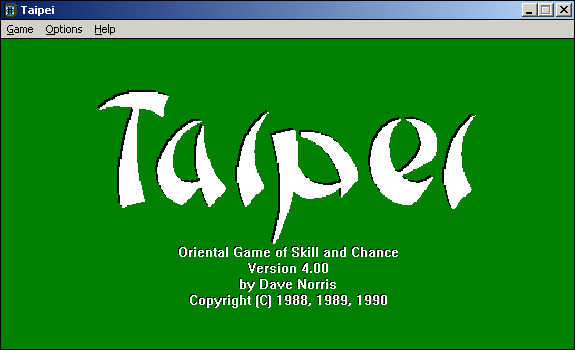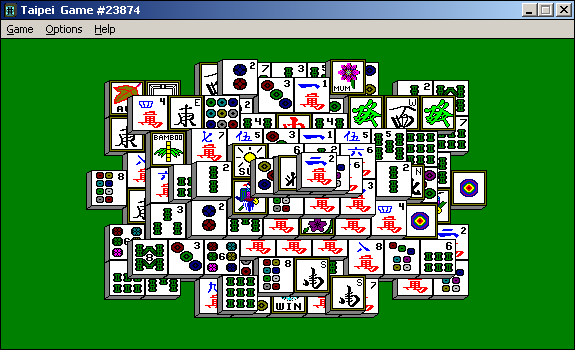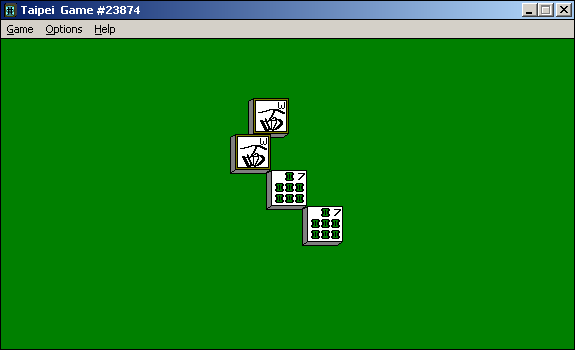Retro Replay Review
Gameplay
At its core, Taipei delivers a straightforward yet addictive puzzle experience that centers on matching pairs of Mahjongg–style tiles. Players scan a multilayered tableau, seeking “free” tiles—those with at least one long side unobstructed—then click on matching patterns to clear them from the board. This simple mechanic belies a deep well of strategy: selecting which pairs to remove first can open or close critical pathways to remaining tiles.
(HEY YOU!! We hope you enjoy! We try not to run ads. So basically, this is a very expensive hobby running this site. Please consider joining us for updates, forums, and more. Network w/ us to make some cash or friends while retro gaming, and you can win some free retro games for posting. Okay, carry on 👍)
One of Taipei’s defining features is its randomly generated layouts. Each new game shuffles the tiles into different formations, offering limitless replayability. However, this procedural element sometimes yields unsolvable configurations, meaning a perfectly played session can end in an unwinnable stalemate. For some, this risk adds tension; for others, it can feel like frustration when a promising board suddenly grinds to a halt.
Despite this occasional dead end, Taipei shines in its pacing. Early levels move swiftly, offering satisfying streaks of matches, while later stages introduce larger, more convoluted stacks that slow you down and force more deliberate planning. The inclusion of a simple tile-highlighting aid for first-time players keeps the learning curve gentle, and the absence of a strict time limit allows casual gamers to enjoy the puzzle at their own pace.
Another strength lies in Taipei’s intuitive controls. A single click selects a tile and a second click selects its match; misclicks are easily undone, and there’s no penalty for exploring different removal sequences. This ease of use makes it ideal for both newcomers to Mahjongg puzzles and experienced tile-matching veterans seeking a quick brain teaser on a coffee break.
Graphics
Released as part of the Microsoft Entertainment Pack for Windows, Taipei embraces a clean, colorful 2D aesthetic. The Oriental-motif patterns atop each tile are distinctive and easy to distinguish, ensuring that players never struggle to tell one design from another. The vibrant hues pop against the subdued, wood-grain background, evoking the classic feel of a Mahjongg tabletop.
Despite the technical limitations of early Windows environments, Taipei’s art remains pleasingly crisp. Tiles are rendered with sufficient resolution to avoid pixelation, and modest shading gives them a slight three-dimensional presence. There are no flashy animations or particle effects—each matched pair simply fades away or “pops” off the stack—yet this minimalism keeps the screen uncluttered and the focus squarely on puzzle solving.
Menus and interface elements adhere to the familiar Windows 3.x/95 style, with straightforward buttons for starting new games, shuffling unsolvable boards, or toggling hint modes. While these UI components feel dated by modern standards, they carry a nostalgic charm for gamers who grew up in the era of chunky, blue-gray window frames and blocky icons.
Overall, Taipei’s graphical package doesn’t attempt to dazzle; instead, it opts for clarity and functionality. The result is a timeless look that has aged surprisingly well, making it easy for today’s players to jump right in without grappling with visual confusion.
Story
As a pure puzzle title, Taipei foregoes any traditional narrative or character development. There’s no quest, no heroine in peril, no text logs to piece together. Instead, the game’s “story” is told entirely through its evolving tile layouts and the personal journey of the player striving to clear the board.
That said, Taipei does succeed in evoking the serene atmosphere of traditional Mahjongg parlors. The tile designs draw from classic Oriental motifs—flowers, dragons, bamboo stalks—and the absence of background music or distracting cutscenes invites a meditative state of mind. Players often report a sense of calm focus, as if they’ve been transported to a quiet room with only tiles on a table and a simple goal to achieve.
For many, the lack of a formal plot is a feature rather than a drawback. Taipei isn’t trying to tell a saga; it’s offering a mental retreat from the day’s demands. In that respect, the game’s “story” becomes the personal narrative each player crafts: the triumphant unravelling of a complex tile stack, the near-miss close calls where only one pair stands between victory and defeat.
Overall Experience
More than three decades after its release in the Microsoft Entertainment Pack for Windows (and later the Best of Microsoft Entertainment Pack), Taipei remains an enduring classic in the realm of casual puzzle games. Its blend of accessibility, replayability, and gentle challenge has made it a staple in offices, schools, and homes around the world, perfect for short bursts of engagement or longer relaxation sessions.
While the occasional unwinnable board can provoke frustration, Taipei’s shuffle feature provides an instant reset, letting players dive back in without penalty. The lack of timers or lives further cements its status as a no-pressure puzzle experience, suitable for gamers of all ages and skill levels. Whether you have five minutes or fifty, Taipei fills that time with satisfying click-and-remove fun.
Ultimately, Taipei’s greatest strength is its timeless simplicity. You don’t need a high-end PC or the latest graphics card to run it—any machine that can handle early Windows will do. And while modern tile-matching games offer flashy power-ups and elaborate progression systems, Taipei’s silent efficiency stands out as a reminder that the simplest mechanics can be the most engrossing.
For anyone seeking a classic, no-frills puzzle to unwind with, Taipei is an easy recommendation. It may not reinvent the wheel, but it honors the Mahjongg tradition with elegant restraint and delivers a reliable, calming puzzle fix whenever you need it.
 Retro Replay Retro Replay gaming reviews, news, emulation, geek stuff and more!
Retro Replay Retro Replay gaming reviews, news, emulation, geek stuff and more!








Reviews
There are no reviews yet.